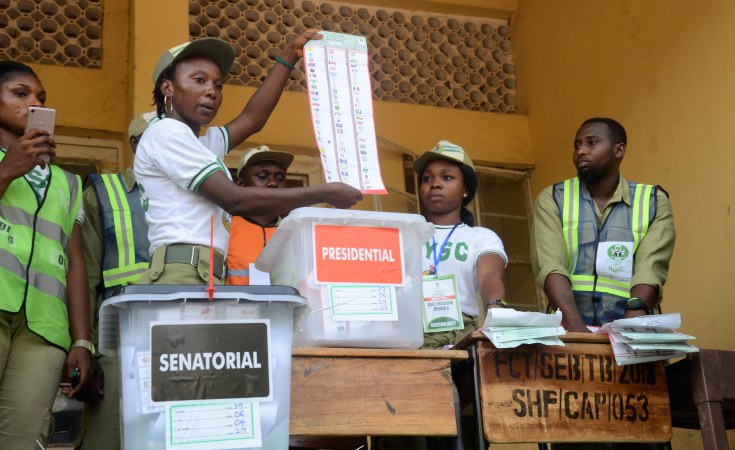Voters in Nigeria, Africa's most populous nation, head to the polls Saturday to cast ballots in presidential and parliamentary elections. President Muhammadu Buhari, who is in his second term in office, is not eligible to run again after serving the maximum of eight years in office. There are three main presidential candidates running to succeed him and the race is seen as the most competitive since the country switched from military rule to democracy in 1999. Here is what to know about the elections:
When is voting?
Polling stations are open from 8:30 a.m.-2:30 p.m. local time, however, anyone in line by 2:30 p.m. will be allowed to cast a ballot.
How many people can vote?
More than 93 million Nigerians are registered to vote and can cast ballots in about 176,600 polling stations across the country.
Who is running in the presidential race?
Eighteen candidates are running to succeed President Buhari. However, only three of them are seen as having a strong chance to win -- Lagos Governor Bola Tinubu, who is the candidate for the ruling All Progressives Congress; former Vice President Atiku Abubakar, of the main opposition People's Democratic Party; and Peter Obi, a third-party candidate of the smaller Labour Party.
How does a presidential candidate win?
A presidential candidate needs to receive the largest number of votes cast nationwide as well as receive at least a quarter of the vote in at least 24 states. Nigeria has 36 states.
What if no one meets this threshold?
If no candidate receives the most votes and at least a quarter of the vote in 24 states, the top two candidates will compete in a runoff.
When would a runoff take place?
The constitution stipulates a runoff must be held within 21 days of the announcement of the election results.
How does a parliamentary candidate win?
Candidates for a seat in the House of Representatives or the Senate need only win a simple majority of votes in their district.
What are the main issues?
Nigeria is facing double-digit inflation, a currency shortage, and security troubles, including an Islamist insurgency in the northeast and separatist violence in the southeast. All three of the main presidential candidates have made improving the economy and strengthening security their main priorities.
Are there concerns of fraud?
Nigeria has a long history of electoral fraud. The Independent National Electoral Commission has banned the use of mobile phones at voting stations to try to curb the illegal practice of candidates paying people to vote for them. In such cases, voters would often use photographs of their ballots as evidence in order to receive payments. "Vote buying remains a major threat to our democracy," Mahmood Yakubu, the head of Nigeria's election commission, told reporters Thursday. The electoral commission has also set up a system to identify voters through fingerprints and facial recognition, to curb voter fraud.
Are there concerns of violence?
Past elections have been marked by violence, including clashes between supporters of rival parties. The top presidential candidates this year signed a peace accord on Wednesday, to ensure a peaceful election. Nigeria's army and police have also pledged to ensure a peaceful election.
When are results expected?
Election officials are expected to start releasing results Sunday; however, full tallies are not expected for several days. The election commission has not said when it expects to declare official results.
Some information in this report came from The Associated Press, Reuters, and Agence France-Presse.


